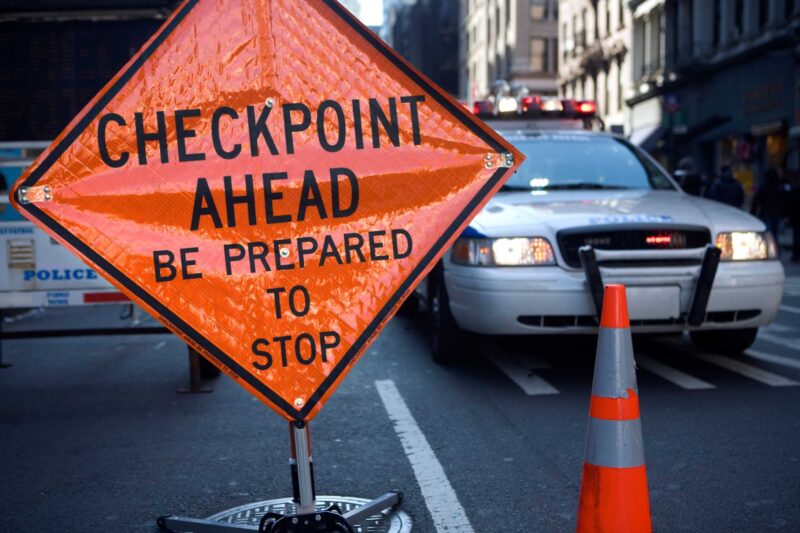It might be an inconvenience, but many of us are accustomed to the occasional police checkpoint stop. We might assume the purpose of these stops is purely to catch drivers operating their motor vehicles under the influence, however under North Carolina state statute N.C.G.S. § 20-16.3A, these checkpoints may have a variety of purposes and methods of operation. Intuitively, any police that involves search and seizure, such as searching a stopped car and demanding to see license and registration, can incite concerns and possible questions about our constitutionally protected rights. However, absent any significant deviation from requirements laid out by the statute, police checkpoints may stop any car going through the checkpoint and ask to see a driver’s documentation.
To conduct a valid checkpoint, police are required to comply with a few standards. They must offer notice to the public, they must abide by a predetermined plan for stopping vehicles, the checkpoint must have a valid purpose, and the checkpoint’s predetermined plan and purpose must be in a written policy (although oral deviations are permissible). The Supreme Court ruled that a purpose as broad as ensuring road safety and a plan as inclusive as stopping every car that comes through a checkpoint are valid in light of statutory requirements. Similarly, a parked police car with blue lights on before the beginning of the checkpoint is sufficient for fulfilling the public notice requirement.
The Fourth Amendment protects citizens from unreasonable search and seizure. In several cases, individuals have tried to argue that checkpoints are ‘unreasonable’ and that demanding to see their driver’s license and registration is unconstitutional in light of the Amendment. However, by case law and statute, the state has the right to conduct these checkpoints and demand to see documents. The practice is considered ‘reasonable’ in light of the state’s interest in keeping the roads safe. Without some deviation from the standards, it is perfectly legal and constitutional for officers to stop cars and ask for license and registration. Failure to comply with checkpoint requests for documentation can be used as ‘probable suspicion’ to detain a driver for further investigation. However, an officer is not permitted to act out of accordance with the standard in his decision-making.
Overall, although it may seem an unnecessary nuisance at times, police checkpoints conducted under the North Carolina state statute are generally supported by case law and Supreme Court rulings, and so long as officers comply with the outlined statute regarding plan, purpose, and policy, they are constitutional and legal. A police officer often has the instruction to ask for a license and registration and the liberty to detain someone who refuses to supply the document. If there is a question about police conduct not meeting the statute standards, there is a possible claim against the stop, however, it is not an immediate defense and dismissal of any further action taken under reasonable suspicion. In general, compliance first and debate later might be an easier strategy for drivers who might be unsure about the practices at a checkpoint.
At King Law, there are attorneys throughout North and South Carolina who handle these types of cases and can represent you in this unique situation. Call us today at 888-748-5465 (KING) to request a consultation with one of these experienced attorneys.


